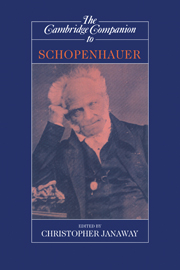Book contents
- Frontmatter
- Introduction
- 1 Schopenhauer on the Self
- 2 Schopenhauer and Knowledge
- 3 The Fourfold Root
- 4 Schopenhauer, Kant, and the Methods of Philosophy
- 5 Will and Nature
- 6 The Influences of Eastern Thought on Schopenhauer’s Doctrine of the Thing-in-Itself
- 7 Ideas and Imagination
- 8 Schopenhauer’s Narrower Sense of Morality
- 9 Schopenhauer on Death
- 10 Schopenhauer’s Pessimism
- 11 Nietzsche, Schopenhauer, and Dionysus
- 12 Schopenhauer, Will, and the Unconscious
- 13 Schopenhauer and Wittgenstein
- Bibliography
- Index
11 - Nietzsche, Schopenhauer, and Dionysus
Published online by Cambridge University Press: 28 May 2006
- Frontmatter
- Introduction
- 1 Schopenhauer on the Self
- 2 Schopenhauer and Knowledge
- 3 The Fourfold Root
- 4 Schopenhauer, Kant, and the Methods of Philosophy
- 5 Will and Nature
- 6 The Influences of Eastern Thought on Schopenhauer’s Doctrine of the Thing-in-Itself
- 7 Ideas and Imagination
- 8 Schopenhauer’s Narrower Sense of Morality
- 9 Schopenhauer on Death
- 10 Schopenhauer’s Pessimism
- 11 Nietzsche, Schopenhauer, and Dionysus
- 12 Schopenhauer, Will, and the Unconscious
- 13 Schopenhauer and Wittgenstein
- Bibliography
- Index
Summary
If Schopenhauer . . . posited a general depression as the tragic condition, if he suggested to the Greeks (– who to his annoyance did not ‘resign themselves’ –) that they had not attained the highest view of the world – that is parti pris, logic of a system, counterfeit of a systematizer: one of those dreadful counterfeits that ruined Schopenhauer’s whole psychology, step by step (– arbitrarily and violently, he misunderstood genius, art itself, morality, pagan religion, beauty, knowledge, and more or less everything).
Nietzsche, The Will to Power, §851Do you desire the most astonishing proof of how far the transfiguring power of intoxication can go? – ‘Love’ is this proof: that which is called love in all languages and silences of the world.
Nietzsche, The Will to Power, §808READING NIETZSCHE’S SCHOPENHAUER
It would not be misleading to say that at the time he wrote The Birth of Tragedy, Nietzsche was so steeped in Schopenhauer that he perceived whatever he perceived through the lens of Schopenhauerian distinctions and categories. Certainly it is hard to make sense of the concepts of the Apollonian and Dionysian, and many other insuf- ficiently explained aspects of Nietzsche's argument in that cryptic work, without relating them to Schopenhauer's more explicit and extensive arguments.
- Type
- Chapter
- Information
- The Cambridge Companion to Schopenhauer , pp. 344 - 374Publisher: Cambridge University PressPrint publication year: 1999
- 5
- Cited by

